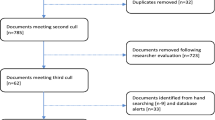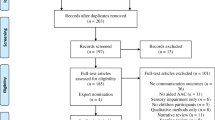Abstract
African Americans experience a significantly greater burden of Alzheimer’s disease (AD) compared to non-Hispanic White Americans. Raising awareness and increasing knowledge of AD within African American communities is an important step towards addressing these disparities. The purpose of this study was to assess the effectiveness of two approaches to sharing AD knowledge with community residents. Using a quasi-experimental design, African American participants were recruited through community partners and local resources in two comparable neighborhoods in Duval County, Florida, which formed the intervention and the comparison groups for this study. The identical 40-min educational lecture was provided to both groups. In the intervention community, the lecture was followed by focus group sessions modeled after the Dementia Friendly America toolkit. In the comparison community, the lecture was followed by a social event where participants could interact informally with the speaker and dementia outreach staff. A brief quantitative survey assessing AD knowledge was administered to participants in both groups before the education session, immediately after the lecture, and 2 months later. Results indicate that both groups improved their knowledge scores at immediate post-test. Scores for both groups declined at 2-month follow-up, but the comparison group’s scores declined more precipitously than the intervention group’s scores (p = 0.0.21). These results suggest that conducting focus groups and interviews following a lecture on AD may help better retain AD knowledge over time.

Similar content being viewed by others
Data Availability
The survey data used in this study is available upon request.
Code Availability
Not applicable.
References
Alzheimer’s Association. 2021 Alzheimer’s disease facts and figures: special report on race, ethnicity and Alzheimer’s in America [Internet]. 2021. Available from: https://www.alz.org/media/Documents/alzheimers-facts-and-figures.pdf. Accessed 28 March 2021.
Mayeda ER, Glymour MM, Quesenberry CP, Whitmer RA. Inequalities in dementia incidence between six racial and ethnic groups over 14 years. Alzheimers Dement. 2016;12:216–24. https://doi.org/10.1016/j.jalz.2015.12.007.
Shiekh SI, Cadogan SL, Lin L-Y, Mathur R, Smeeth L, Warren-Gash C. Ethnic differences in dementia risk: a systematic review and meta-analysis. Ikram MA, editor. J Alzheimers Dis. 2021;80:337–55. https://doi.org/10.3233/JAD-201209
Ahuja R, Levy C. Better brain health through equity: addressing health and economic disparities in dementia for African Americans and Latinos [Internet]. Washington, D.C.: Milken Institute; 2021. Available from: https://milkeninstitute.org/sites/default/files/reports-pdf/Better%20Brain%20Health_Final.pdf. Accessed 28 March 2021.
Zhou Y, Elashoff D, Kremen S, Teng E, Karlawish J, Grill JD. African Americans are less likely to enroll in preclinical Alzheimer’s disease clinical trials. Alzheimers Dement Transl Res Clin Interv. 2017;3:57–64. https://doi.org/10.1016/j.trci.2016.09.004.
Alzheimer’s Association. Events [Internet]. 2021. Available from: https://www.alz.org/events. Accessed 13 April 2021.
UsAgainstAlzheimer’s. Upcoming events - save the date! [Internet]. 2021. Available from: https://www.usagainstalzheimers.org/events. Accessed 13 April 2021.
Lincoln KD, Chow TW, Gaines BF. BrainWorks: A comparative effectiveness trial to examine Alzheimer’s disease education for community-dwelling African Americans. Am J Geriatr Psychiatry. 2019;27:53–61. https://doi.org/10.1016/j.jagp.2018.09.010.
Gluck MA, Shaw A, Hill D. Recruiting older African Americans to brain health and aging research through community engagement: lessons from the African-American Brain Health Initiative at Rutgers University-Newark. Gener San Franc Calif. 2018;42:78–82 (PMCID: PMC6404737).
National Alzheimer’s Coordinating Center. UDS demographics and diagnoses [Internet]. 2021. Available from: https://naccdata.org/requesting-data/data-summary/uds. Accessed 08 July 2021.
Dementia Friendly America. About DFA [Internet]. 2021. Available from: https://www.dfamerica.org/what-is-dfa. Accessed 03 March 2021.
World Dementia Council. Defining dementia friendly initiatives [Internet]. 2020. Available from: https://worlddementiacouncil.org/sites/default/files/2020-09/DFIs%20-%20Paper%201_V14.pdf. Accessed 16 May 2021.
ACT on Alzheimer’s. About [Internet]. 2021. Available from: https://www.actonalz.org/about. Accessed 16 May 2021.
ACT on Alzheimer’s. Dementia Friendly Communities Toolkit [Internet]. 2021. Available from: https://www.actonalz.org/dementia-friendly-toolkit. Accessed 23 March 2021.
Brush BL, Mentz G, Jensen M, Jacobs B, Saylor KM, Rowe Z, et al. Success in long-standing community-based participatory research (CBPR) partnerships: a scoping literature review. Health Educ Behav. 2020;47:556–68. https://doi.org/10.1177/1090198119882989.
Department of Elder Affairs. Dementia-caring communities initiatives fact sheet [Internet]. 2021. Available from: https://elderaffairs.org/wp-content/uploads/DCCI-Fact-Sheet_2021-March-2021.pdf. Accessed 16 May 2021.
Epps F, Alexander K, Brewster GS, Parker LJ, Chester M, Tomlinson A, et al. Promoting dementia awareness in African-American faith communities. Public Health Nurs. 2020;37:715–21. https://doi.org/10.1111/phn.12759.
Epps F, Choe J, Alexander K, Brewster G. Designing worship services to support African-American persons living with dementia. J Relig Health. 2020;59:2163–76. https://doi.org/10.1007/s10943-020-00993-x.
Epps F, Heidbreder V, Alexander K, Tomlinson A, Freeman V, Williams N. A Dementia-friendly church: how can the African American church support families affected by dementia? Dementia. 2021;20:556–69. https://doi.org/10.1177/1471301219900416.
Alzheimer’s Disease International. Dementia friendly communities: key principles [Internet]. 2016. Available from: https://www.alzint.org/u/dfc-principles.pdf. Accessed 16 May 2021.
Jones L, Collins BE. Participation in action: the Healthy African American Families community conference model. Ethn Dis. 2010;20(S2):15–20 (PMCID: PMC3791219).
United States Census Bureau. 2019 American community survey 5-year estimates [Internet]. 2020. Available from: http://www.census.gov/. Accessed 16 May 2021.
Dementia Friendly America. Phase 2 engage [Internet]. 2021. Available from: https://www.dfamerica.org/community-toolkit-phase-2. Accessed 16 May 2021.
Carpenter BD, Balsis S, Otilingam PG, Hanson PK, Gatz M. The Alzheimer’s disease knowledge scale: development and psychometric properties. Gerontologist. 2009;49:236–47. https://doi.org/10.1093/geront/gnp023.
R Core Team. R: a language and environment for statistical computing. R Foundation for Statistical Computing, 2020; Vienna, Austria.
Barnes LL, Bennett DA. Alzheimer’s disease in African Americans: risk factors and challenges for the future. Health Aff (Millwood). 2014;33:580–6. https://doi.org/10.1377/hlthaff.2013.1353.
Denny A, Streitz M, Stock K, Balls-Berry JE, Barnes LL, Byrd GS, et al. Perspective on the “African American participation in Alzheimer disease research: effective strategies” Workshop, 2018. Alzheimers Dement. 2020;16:1734–44. https://doi.org/10.1002/alz.12160.
Acknowledgements
The authors would like to sincerely thank all study participants for engaging in this research project as well as community partners who provided space for project activities.
Funding
Funding for this project was received from the Florida Department of Health Ed and Ethel Moore Alzheimer’s Disease Research Program (FL 8AZ08) and the Mayo Clinic Alzheimer’s Disease Research Center (P30 AG62677). This research was also made possible by the Mayo Clinic Center for Clinical and Translational Science (CCaTS) through a grant from the National Center for Advancing Translational Sciences (NCATS), a component of the National Institutes of Health (NIH UL1 TR002377).
Author information
Authors and Affiliations
Contributions
J.A.L. designed and directed the study. All authors except for J.E.C. and C.T.B. were involved in planning the study, developing the survey, and collecting the data. J.E.C. and C.T.B. performed the data analysis. C.D.B. and J.A.L. wrote the manuscript. All authors reviewed, commented, and agreed with the final version of the manuscript.
Corresponding author
Ethics declarations
Ethics Approval
This study was approved by the [blinded for peer review]’s institutional review board (Ethics #18–002736).
Consent to Participate
This study was deemed minimal risk and required only verbal assent from all study participants prior to data collection. All participants agreed to participate in this study.
Consent for Publication
All participants provided consent for the research team to disseminate the results of this study through scientific publications and conference presentations.
Conflict of Interest
The authors declare no competing interests.
Additional information
Publisher's Note
Springer Nature remains neutral with regard to jurisdictional claims in published maps and institutional affiliations.
Rights and permissions
About this article
Cite this article
Bergeron, C.D., Robinson, M.T., Willis, F.B. et al. Testing an Alzheimer’s Disease Educational Approach in Two African American Neighborhoods in Florida. J. Racial and Ethnic Health Disparities 9, 2283–2290 (2022). https://doi.org/10.1007/s40615-021-01165-7
Received:
Revised:
Accepted:
Published:
Issue Date:
DOI: https://doi.org/10.1007/s40615-021-01165-7




